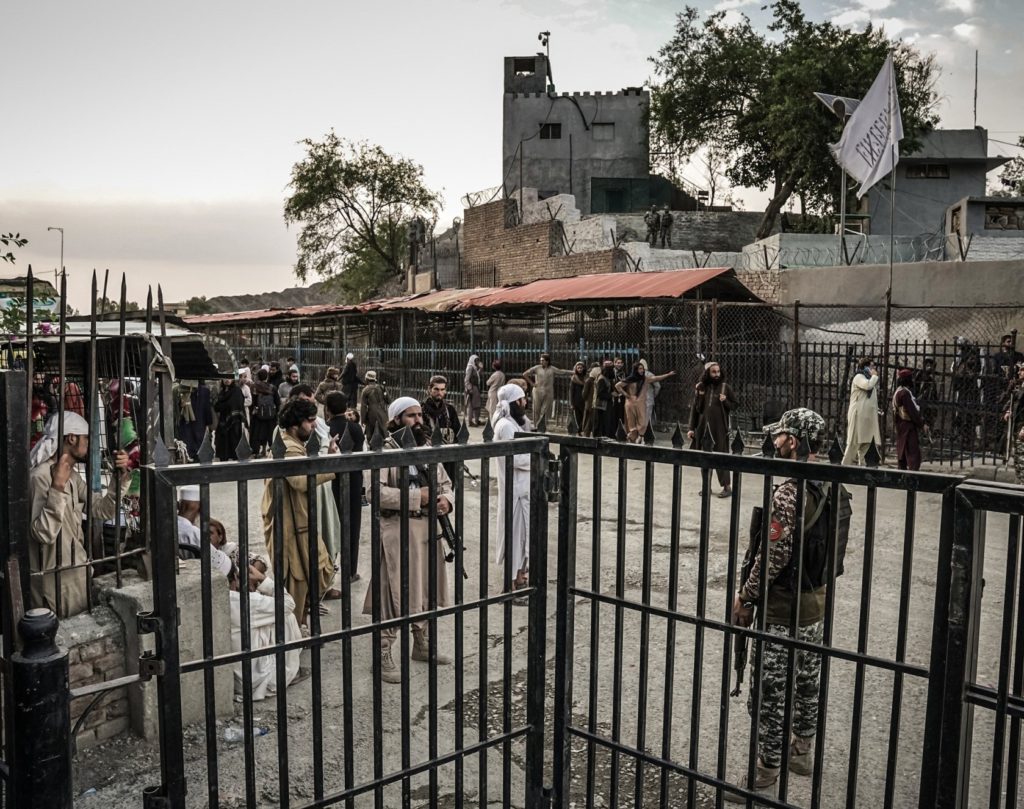“With the U.S. military now out of Afghanistan, the task of evacuating tens of thousands of Afghan allies left behind falls to nongovernmental organizations and international aid groups — who say they are unable to tell them where to go next,” NBC News reported on Monday, August 30, 2021, just after the last U.S. troops and military planes left Kabul. (Read story here.)
During the preceding weeks, the Taliban fighters occupying Kabul allowed Americans free passage to the airport, but blocked Afghans from fleeing. They’re also blocking roads out of the country (photo below).
All governments try to control their borders and who comes in. But who tries to prevent their own citizens from leaving? Mostly bloodthirsty totalitarian regimes.
There are additional specific reasons to suspect a bloodbath is coming in Afghanistan.
First, the Taliban lost over 50,000 killed in their 20-year war against U.S. occupiers. They’re not likely to be in a forgiving mood toward Afghans they regard as enemy collaborators. Second, most Taliban are Pashtuns, the dominant Afghan tribe, and seeking revenge is a core tenet of Pastunwali, the centuries-old Pashtun social code.
The Taliban have earned a reputation for brutality. They claim they’ve changed. The world is skeptical, and ought to be. If they only want to rule their country, why wouldn’t they let dissidents leave? They’d be better off from their absence. Trapping people inside the country who want to leave has ominous implications.
But, Reuters says (here), “The Taliban have pledged to allow all foreign nationals and Afghan citizens with travel authorization from another country to leave Afghanistan, according to a joint statement issued by Britain, the United States and other countries on Sunday.” But if that’s the case, why didn’t they let Afghans with U.S.-issued SIVs (Special Immigration Visas) into the Kabul airport for evacuation flights?
The U.S. left some equipment behind to keep the airport operational, and Reuters says, “The Taliban are in talks with governments like Qatar and Turkey to seek assistance to continue civilian flight operations from there, the only way for many people to leave Afghanistan.” Turkey’s foreign minister told Reuters the airport needs repairs before civilian flights can resume.
Meanwhile, U.S. officials also say they “will work with Afghanistan’s neighbors to secure their departure either over land or by charter flight once the Kabul airport reopens,” the Associated Press said (here).
Despite all the warning signs, if the Taliban leaders are rational actors, they won’t undertake actions sure to alienate the international community. The country faces an immediate humanitarian crisis and is in desperate need of foreign assistance and aid. Some 18 million of the country’s 41 million people face hunger. Afghanistan was already one of the world’s most underdeveloped and poorest countries, and after 40 years of continuous war, it needs rebuilding.
It’s easy to assume the Taliban don’t care about any of that, only about consolidating their power and imposing social control. But Afghanistan remains a factionally-riven, tribally-divided society; and if the Taliban fail to address the population’s needs, they could find their rule challenged from within. Afghanistan is a place where nearly every adult male has a gun, and knows how to use it.
